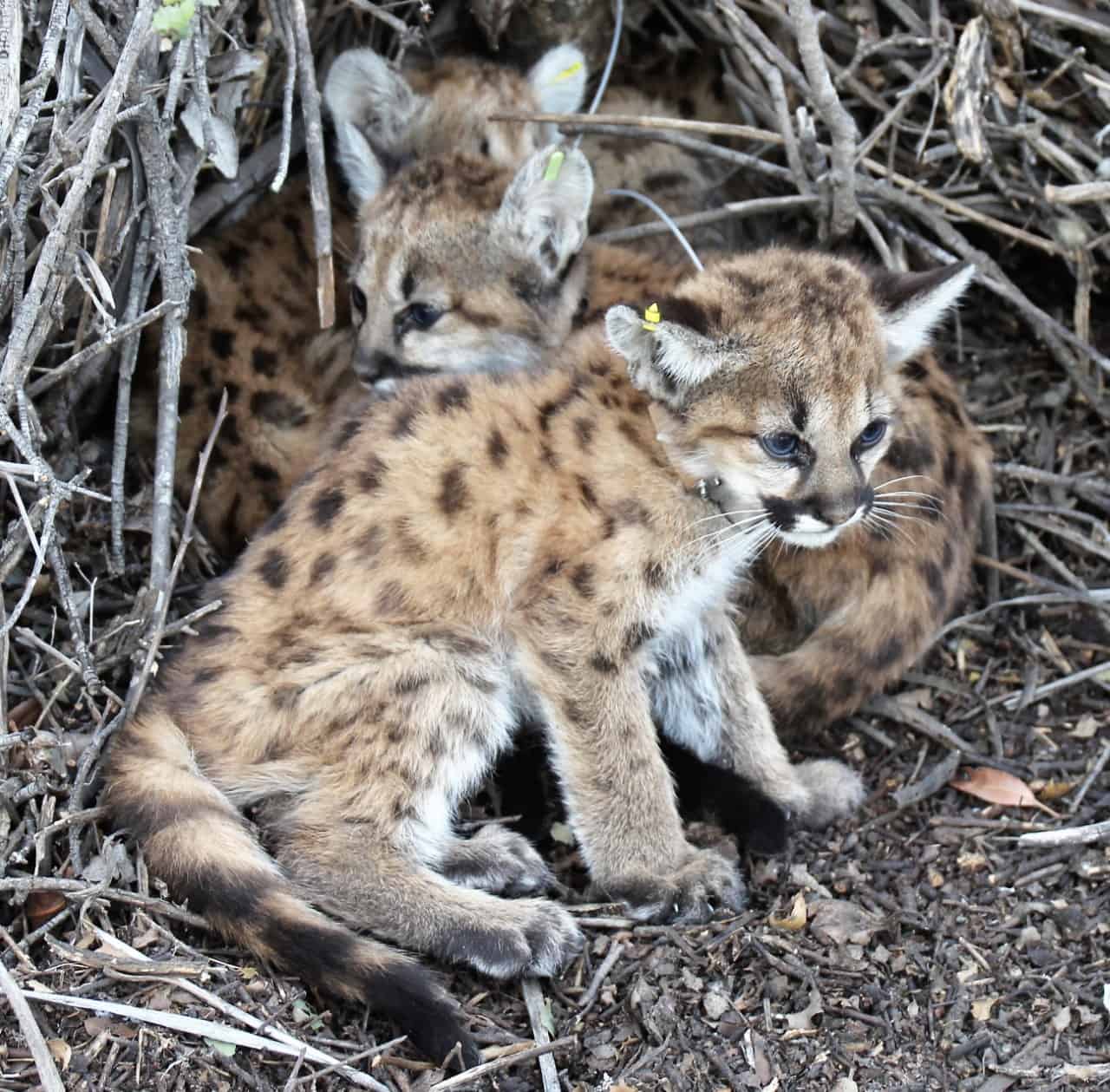NPS News Release Date: December 9, 2021
THOUSAND OAKS, Calif.— Last week, National Park Service biologists assisted the California Department of Fish and Wildlife (CDFW) with four mountain lion kittens that were discovered under a picnic table near a Thousand Oaks office building that abuts open space.
The four kittens, all females, were alone and thin, but in stable condition. They appeared to be about six weeks old. NPS biologists fitted the kittens – P-100, P-101, P-102, and P-103 – with tracking collars and collected biological samples, thereby bringing them into the research study the NPS has conducted for the last two decades. The mother of the kittens is unknown and was not being tracked by the NPS.
Because the kittens were in a public space, biologists continued to monitor them hoping their mother would return. When this didn’t happen, CDFW, with help from the NPS, took the kittens to a local veterinarian where two died overnight. The other two kittens were transferred to a veterinary hospital in Orange County where they are still being treated.
“We did everything we could to reunite these kittens with their mother, but I’m afraid she was likely already dead or had abandoned them,” said Jeff Sikich, an NPS biologist with Santa Monica Mountains National Recreation Area who has been studying the mountain population since 2002. “The ideal situation is to keep these kittens wild and in their natural environment. That was the goal, but unfortunately it didn’t work out in this case because the mother was not returning, and the condition of the kittens were deteriorating.”
The saga began in the late afternoon of Monday, November 29, when an office worker called wildlife officials and reported seeing four mountain lion kittens under a picnic table. He was told by biologists at CDFW to leave them alone in hopes that they would go back into the surrounding open space and reunite with their mother.
The following morning the kittens were found even closer to the office building. They were next to a recycling bin and were visible to office workers watching from inside. After about an hour, the kittens slowly lumbered off into the nearby open space.
Biologists from both agencies, NPS and CDFW, conferred on what to do, and they decided that it would be worthwhile to find the kittens, tag them and affix tiny, expandable VHF radio collars to their necks. This way, biologists could track and rescue the brood in case the mother did not return and also assess their health and give them fluids if needed.
All four kittens were found close together under thick brush. They were captured and a full workup was performed that included collecting biological samples, taking their measurements, attaching an ear tag, conducting a physical exam, and placing the tiny collars on them.
The kittens weighed between 3 1/2 lbs. to 4 1/2 lbs. and were given fluids. They were still active, moving around, and aware of their surroundings.After the workup, they were placed back together in thick brush in a makeshift “den.”
Biologists set up trail cameras nearby.The following morning, December 1, they were spotted huddled together about 50 feet away from where they were captured the day before. After checking the wildlife cameras that had been set up, biologists determined that their mother had not returned that night.
Again, the biologists discussed what to do and they decided to give the mother one more night. If she did not return, then CDFW would rescue the kittens. Biologists say mountain lion mothers may leave their kittens for 2-3 days to hunt and then return to the den. Although the biologists still did not know the location of the mother, they set out bait a couple of canyons away in case she was having a difficult time finding food.
Later that same day, NPS biologists checked on the kittens again and noticed that one of them – P-102 – did not follow her three siblings when they moved to a new location. That kitten appeared to be especially in poor health.
It was at this point that the decision was made to rescue all the kittens. They were taken to a local veterinarian, but, unfortunately, two of the kittens passed away overnight – P-102 and then shortly after, P-100.
The following morning, Thursday, the two surviving kittens – P-101 and P-103 – were taken to a veterinary hospital in Orange County by CDFW biologists. Clinicians at the animal hospital are currently waiting on some tests and then the kittens will be temporarily housed at the Orange County Zoo until a permanent home can be found for them.
NPS has been studying mountain lions in and around the Santa Monica Mountains to determine how they survive in a fragmented and urbanized environment for the last two decades. CDFW is responsible for overseeing the management and conservation of mountain lions in the state.
Santa Monica Mountains National Recreation Area (SMMNRA) is the largest urban national park in the country, encompassing more than 150,000 acres of mountains and coastline in Ventura and Los Angeles counties. A unit of the National Park Service, it comprises a seamless network of local, state, and federal parks interwoven with private lands and communities. As one of only five Mediterranean ecosystems in the world, SMMNRA preserves the rich biological diversity of more than 450 animal species and 26 distinct plant communities. For more information, visit nps.gov/samo.
Contact: Ana Beatriz Cholo, 805-750-9356






